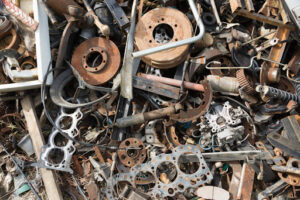You know that scrap metal recycling is good for the planet. But what about the economic benefits of recycling scrap metal? In other words, how does scrap metal affect your business’s bottom line?
There are two general ways to look at the economic benefits of recycling scrap metal. First, how scrap recycling benefits you/your business directly, and second, how scrap recycling benefits the economy more globally.
What are the economic benefits of recycling scrap metal for your company?
 Metal is almost always valuable for recycling. Unlike paper fibers, which can only be recycled a few times at the most, metal can be melted down and reformed over and over again without losing quality. Because manufacturers are always in need of metal, recyclers are always looking to buy scrap to meet that demand.
Metal is almost always valuable for recycling. Unlike paper fibers, which can only be recycled a few times at the most, metal can be melted down and reformed over and over again without losing quality. Because manufacturers are always in need of metal, recyclers are always looking to buy scrap to meet that demand.
Most, if not all, of your business’s scrap metal, can be sold for cash. But it’s near impossible to say how much you can get paid for your scrap metal since prices fluctuate all the time, and obviously, some types of scrap are always more valuable than others. Here’s a quick review of some of the types of scrap metal your business might generate and how much they might be worth.
- Copper: Last year, I told you about the dramatic swings in the global copper market. Copper prices had reached an all-time high above $10,000/ton. Prices were expected to drop, which they did, but they’re still way up right now; S&P Global forecasts copper prices to hover just below $9,000 for the rest of spring 2023. For you, those high prices translate to more money for your scrap copper. Different grades of copper have different prices, but lately, sellers have been earning more than $3/lb for bare copper wire and copper tubing.
- Iron and steel: Ferrous metals (those that contain iron) are widely recycled. They’re also generally far less valuable than non-ferrous metals, pound for pound. That said, scrap vehicles and things like heavy steel fixtures or other equipment might still net your business more than $100 in cash. Definitely preferable to lugging these items to a landfill and paying to discard them.
- Non-ferrous metals: Generally speaking, metals that don’t contain iron are worth more money as scrap. The Institute of Scrap Recycling (ISRI) estimates that non-ferrous metals make up just 10% of the volume of scrap metal recycled in the U.S. each year but account for 50% of the industry’s value. Brass isn’t far behind copper on the list of most valuable scrap metals, so your business should definitely be selling any obsolete brass pipes and fixtures for cash. Aluminum is also sellable in all its forms, from aluminum sheeting to the soda cans from your break room.
What are the more global economic benefits of recycling scrap metal?
According to the ISRI’s 2021 economic impact report, the recycling industry as a whole generated nearly $117 billion a year in benefits for the U.S. economy. The ISRI also estimated that recycling accounted for more than 506,000 American jobs and that the industry contributed about $5 billion annually in revenue for local governments. In addition, the U.S. Geological Survey 2022 report showed iron and steel scrap alone generated an estimated $23 billion in domestic sales and exports last year.
The scrap metal industry in particular plays a key role in both global and local supply chains since manufacturers rely so much on recycled metal. A drop in the supply of scrap metal would drive up demand for virgin metal, which would raise prices for construction, transportation, food, and a lot of the other things we all need to pay for. So it’s safe to say that scrap recycling is a vital part of the U.S. economy.
There’s also some overlap between the environmental benefits of scrap metal recycling and the indirect economic benefits for consumers. Recycling scrap metal conserves huge quantities of raw materials and energy. Per the USGS, the amount of energy saved every year by recycling steel from vehicles alone is enough to power 18 million homes all year. Recycling 1 ton of steel conserves 1.1 tons of iron ore, as well as other minerals and other virgin materials.
All the costs that mining companies and processors pay to remove, transport, and refine virgin metal get passed along to buyers. Manufacturers may save on material and energy costs by buying recycled metal to make new products. Those savings (theoretically) get passed along to buyers too. Your business would probably be paying more for some of your supplies and inventory if they weren’t made from recycled scrap.
Miller Recycling is celebrating our 32nd year as a member of ISRI.
We’re proud to be such a long-standing member of the recycling industry’s trade association. Our decades of experience managing scrap metal and other recyclable material make us an asset to clients across many industries. Any time your business has questions about recycling, we have answers.
Miller Recycling is here to make scrap metal recycling as easy and environmentally friendly as possible for your business, but we know that the economic benefits of recycling are also a key motivator. Let’s talk about what kind of competitive pricing you can get from your business’s scrap metal. Contact me today to learn more.

